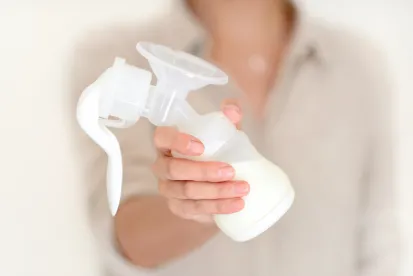On December 29, 2022, the Providing Urgent Maternal Protections for Nursing Mothers Act (PUMP) was signed into law. PUMP further amends the federal Fair Labor Standards Act (FLSA) by extending protections for employees who need to express breast milk at work. PUMP broadens the available remedies for violations and extends employee coverage requirements. The U.S. Department of Labor Wage and Hour Division (the DOL) recently issued guidance on PUMP’s requirements.
Summary of Changes Under PUMP
In 2010, Section 7 of the FLSA was amended by the Patient Protection and Affordable Care Act to include break time and lactation space requirements for employees who needed to express breast milk at work. Those break time and lactation space requirements are addressed in detail below and remain substantively unchanged with the enactment of PUMP. However, PUMP further amends the FLSA to extend its reasonable break time and lactation space protections to pump breast milk at work to as many as 9 million more employees, including FLSA-exempt employees who were not previously covered by the Affordable Care Act’s amendment.
Furthermore, PUMP amends the FLSA to provide a private right of action for aggrieved employees and clarifies how time spent pumping counts as hours worked for minimum wage and overtime purposes if an employee is not completely relieved from their duties during the break.
Break Times and Compensation
Employers must provide employees who need to express breast milk “a reasonable break time” for up to one year after a child’s birth “each time such employee has need to express the milk.” The DOL’s guidance on PUMP makes clear that: (i) an employer may not deny a covered employee break time to pump; (ii) the “frequency, duration, and timing of breaks” will vary depending on factors such as the needs of the nursing employee and child and the lactation space; (iii) the employer and employee may agree to a fixed schedule provided that adherence to the schedule suits the employee’s needs; and (iv) employees who work remotely are also eligible to take pump breaks as if they were working on site.
Employers are not obligated to compensate employees for pump breaks “unless otherwise required by Federal or State law or municipal ordinance.” Exempt employees, such as bona fide executive, administrative, and professional employees, must be compensated during pump breaks, in accordance with the FLSA’s salary basis requirements. Non-exempt employees are not entitled to compensation during pump breaks provided that they are completely relieved from work duties during pump breaks and paid break time is not otherwise required by applicable law. If a pump break is interrupted by work, the time spent working is compensable. For example, if a non-exempt employee receives a work-related phone call during their break, that time will be counted as hours worked, according to the DOL.
Lactation Spaces
Employers must provide employees who need to pump with a place, other than a bathroom, that is shielded from view and free from intrusion from coworkers and the public, and that is available each time an employee needs to pump. The DOL guidance on PUMP elaborates that the designated place must be a “functional space for pumping” and must provide the following: (i) a place for the nursing employee to sit; (ii) a flat surface, other than the floor, on which to place the pump; and (iii) the ability to safely store milk at work (e.g., a refrigerator). Ideally, employers will also provide employees access to electricity, so employees can utilize an electric pump (which operates more efficiently than a battery-operated pump), and access to a sink, so employees can wash their hands and clean pump attachments. There is no one-size-fits-all approach and employers need to consider the number of nursing employees and their work schedules to determine whether more than one space should be designated or created.
Exemptions
There are some exemptions to these break time and lactation space requirements. An employer employing fewer than 50 employees (regardless of location of worksite) is not subject to these requirements if the employer would suffer an “undue hardship” due to the “significant difficulty or expense” of compliance “in relation to the size, financial resources, nature, or structure of the employer’s business.” The DOL advises that small employers “will be exempt only in limited circumstances.”
Crew members who perform duties in an aircraft during flight time, such as pilots and flight attendants, are also exempt from the break time and lactation space requirements. Certain employees of rail carriers and motorcoach services operators are currently exempt, but will be entitled to PUMP’s protections starting December 29, 2025.
Available Remedies
With PUMP’s enactment, employees now possess a private right of action and can seek all legal and equitable remedies available under the FLSA, such as liquidated damages. According to the DOL, these remedies are available regardless of whether the employee has experienced retaliation.
Before filing a civil lawsuit for the failure to provide a lactation space, the employee is required to first notify the employer of the need for a space and provide the employer 10 days to come into compliance, unless: (i) the employee has been fired for exercising their rights under the FLSA or opposing the employer’s conduct; or (ii) the employer expresses a refusal to comply. There are no notice requirements for filing a complaint with the Wage and Hour Division or filing suit to enforce a reasonable break time requirement (not a space requirement).
Notice/Posting Requirements
The Wage and Hour Division has published an updated FLSA poster reflecting the requirements of PUMP, which can be used to satisfy FLSA’s notice and posting requirements.
State or Local Laws
PUMP and the DOL guidance expressly state that nothing in the federal law preempts any state law or municipal ordinance that provides greater protections to employees. New York State, for example, recently clarified employer obligations and employee protections under its Nursing Mothers in the Workplace Act, which will take effect on June 7, 2023. New York State’s Nursing Mothers in the Workplace Act is in addition to New York City’s lactation accommodation law. For additional information on these laws, please click here.
Takeaways
Employers should assess their current break time practices and available lactation spaces to ensure compliance with PUMP. Employers must be mindful of these requirements when communicating with employees about their anticipated break time needs, including the timeframe for providing a lactation space after a request (10 days) and how to handle multiple employee requests for a lactation space.



 />i
/>i

